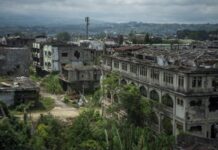
How the cuban missile crisis threatened world peace
EDITORIAL – October 22, 1962 marked a turning point in world history, during a period of staggering tensions between the United States and the Soviet Union, during the so-called “Cold War.” Tensions reached a critical point when US President John F. Kennedy revealed to the world that American spy planes had discovered the installation of Soviet nuclear weapons in Cuba, just a few miles off the American coast. This triggered the Cuban Missile Crisis, an episode that represented one of the most dangerous and tense moments of the Cold War and an imminent danger for a possible world war.
The events that led to this crisis began with the decision of Soviet leader Nikita Khrushchev to install nuclear missiles on the Caribbean island in response to the deployment of US Jupiter missiles in Europe, which were stationed in Italy and Turkey. However, the installation of these missiles in Cuba posed a direct threat to much of the United States territory. Escalating tensions were confirmed by photographic evidence provided by the United States Air Force’s Lockheed U-2 spy planes, which revealed the presence of medium and long-range Soviet missiles in Cuba.
Kennedy ordered a naval blockade around the island of Cuba to prevent further Soviet armament from arriving and announced his determination not to tolerate further arms supplies. This move brought the world to the brink of an imminent nuclear war, with the threat of reprisals and a large-scale conflict looming like a sword of Damocles over the heads of all involved nations.
After intense negotiations, Kennedy and Khrushchev reached a compromise to resolve the crisis. The agreement involved the withdrawal of Soviet missiles from Cuba in exchange for the public commitment of the United States not to militarily invade the island. In secret, the United States also agreed to dismantle their missiles in Italy and Turkey.
The resolution of this crisis marked a turning point in world history, underscoring the need for a direct communication channel between superpowers to avoid a similar situation in the future. The world faced the complex reality of the Cold War, characterized by a struggle for global influence, where ideology and geopolitics clashed in a dangerous dance that could have brought humanity to the brink of nuclear oblivion.
This crisis remained a reminder for future generations, highlighting the importance of open communication channels and diplomatic solutions to avoid the disastrous precipice of a large-scale nuclear war. The Cuban Missile Crisis continued to represent one of the most dangerous and tense chapters in the history of international relations, leaving an indelible mark in the collective memory of the world.
The cuban missile crisis and current threats: a reminder of the importance of diplomacy and peace
History often provides us with valuable lessons on how to address current conflicts. However, it seems that many of the ongoing international conflicts today indicate that we have not fully learned from the mistakes of the past. The Cuban Missile Crisis, a critical moment in history, reminded us of the danger and instability of international conflicts, especially when it comes to potentially nuclear situations.
The current situation between Russia and Ukraine and the escalating conflict between Israel and Palestine in the Middle East are grave, with potentially devastating implications for global stability. Geopolitical tensions and regional rivalries seem to be constantly escalating, bringing the involved nations to the brink of possible violent escalation.
The current crisis between Russia and Ukraine immediately brings to mind the dangerous challenge of the Cold War, with the risk of a large-scale conflict that could have disastrous consequences for the region and the world at large. On the other hand, the growing conflict between Israel and Palestine in the Middle East raises concerns about the perpetuation of a cycle of violence and tensions that seems to have no clear solution.
The international community must learn from the lessons of the past and work together to promote dialogue, diplomacy, and peaceful resolution of conflicts. Diplomacy should be at the center of efforts to prevent escalation and to find lasting solutions that can ensure peace and stability in the region and the world.
Reflecting on the 1962 Cuban Missile Crisis and the current international scenario, it is crucial to recognize the importance of international cooperation, open dialogue, and diplomacy as essential tools to address global challenges. Only through a shared commitment to international peace and security can we hope to avoid the repetition of past mistakes and build a safer and more prosperous future for all.
READ ALSO: Henry Kissinger: A century of controversial and influential diplomacy













